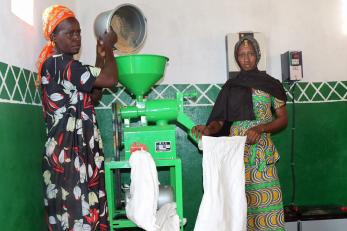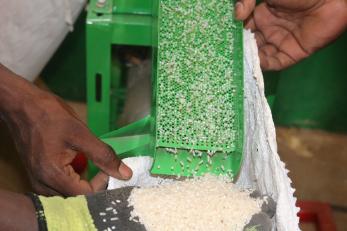Solar hullers are opening up new economic opportunities for subsistence rice farmers

A solar huller is providing fresh impetus to the activities of a small cooperative of rice growers in Koudi, eastern Senegal. It is enabling them to replace the inefficient practice of removing the chaff from the grain by hand with an automated process, so giving them the chance to move beyond subsistence production. Fully subsidised through the Water and Energy for Food Programme (PEEPA / WE4F), the huller is one of two systems being deployed across Senegal to demonstrate the technical and financial viability of the solar technology among small-rice producers, in an effort to improve the efficiency of rice processing and therefore the food security and resilience of local communities.
As for many other small-scale rice producers across Senegal, processing paddy rice has always been a challenge for GIE Koudi Djiké, a cooperative of 25 small-scale rice producers (18 women and 7 men) based in Koudi. Located 20 kilometres from the town of Goudiry in Tamabcounda, Koudi occupies a strategic position because it sits at the intersection of around thirty villages comprising about 2000 producers who practice winter rice cultivation. For these producers, rice is their main subsistence crop and grown solely for household consumption, which is only possible during the rainy season due to the absence of perennial water resources.
The lack of local processing units incurs severe logistical difficulties and expense. It means that the local growers need to travel 100 km from Koudi to husk their paddy rice in the only two available hullers located in Koulor and Bala. To transport and husk one tonne of paddy rice, a producer would typically spend over 50,000 Senegalese Francs ($90), not including food and accommodation. If there is a fuel shortage or a system failure at the facility, the processing stops for a few days, leaving the producers in the lurch. Few growers can afford that cost and the hassle, so they resort to manual husking – a slow and labour-intensive activity often performed by women. It typically takes half a day to pound a 100 kg bag of paddy rice to obtain about 40 kilograms of husked rice.
Such difficulty has led farmers in the region to neglect rice cultivation. It has also highlighted the potential for developing the sector through innovative practices and technologies.
Over the past 12 months, Energy 4 Impact has partnered with SODAGRI to identify communities of rice growers with underdeveloped potential and so provide technical support and agronomic advice.
Due to the lack of a rice processing unit, our producers are forced to shell their paddy rice little by little and store the rest of the unprocessed rice at home for up to two years. The acquisition of the solar equipment, a first in the area, will allow the populations of Koudi and its surrounding area to have their paddy rice processed locally.
Mrs Ba, Technical agent of SODAGRI in Goudiry, the Agricultural and Industrial Development Company of Senegal
GIE Koudi Djiké was selected last July to manage the new rice processing unit installed in the village of Koudi through the PEEPA / WE4F programme. The cooperative was able to produce two tonnes of paddy rice last year, which is still waiting to be husked. For them the new solar huller means a huge reduction in the cost of husking, in manual work and storage time of the paddy rice. Most all it means that they can develop an income stream through the provision of a state-of-the-art processing service and extend the benefits to other local rice farmers.
Solar hullers are a novelty in the rice processing sector in Senegal and their market is unexplored or non-existent in remote, rural areas of the country. In addition, the cost of the technology – 4,320,000 Senegalese Francs ($7,700) – is too steep for small-scale producers and awareness of its potential to develop the sector among public and private sector players is low.
These two pilots will enable us to demonstrate how the technology can radically transform the value chain of the paddy rice sector in the regions of Saint Louis and Tambcounda. They will also enable Energy 4 Impact to design viable and bankable business models to advocate their adoption to decision-makers, further encouraging the private sector, specifically suppliers of solar technologies and financial institutions, to increase their investment in the paddy rice processing sector,
Bayo Thiam, Project Manager, Energy 4 Impact

The solar huller in Koudi has a processing capacity of one tonne per day. Based on the estimated total paddy yield of the surrounding farming communities, the GIE Koudi Djiké cooperative could process 18 tonnes of paddy rice per month. This could earn the cooperative 171,000 Francs ($300) per month. Based on these calculations, a typical cooperative could see a return on the investment after 3 to 4 years of activity.
With no previous technical, marketing and sales experience, the GIE Koudi Djiké have a lot to learn. Energy 4 Impact is providing expert support and guidance to the cooperative’s leaders on the use of the processing unit while strengthening their entrepreneurial skills, specifically in financial and commercial management.
Through the training provided by SODAGRI and the Energy 4 Impact team, our cooperative is better equipped to seize this unprecedented opportunity. By mechanising the husking process, we can generate additional income and provide a vital service to the community of Koudi.
Mrs Thiam Sissoko, President, GIE Koudi Djiké